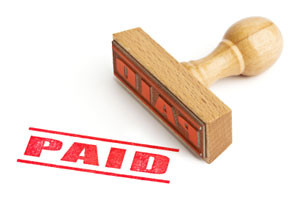Today’s top story: There’s more than one way to slay a debt. Also in the news: How to know when it’s OK to spend, 3 steps to spring cleaning your credit card debt, and what to do when you desperately need help with medical bills.
There’s More Than One Way to Slay a Debt
These key points could help.
How to Know When It’s OK to Spend
Loosening the purse strings.
3 Steps to Spring-Cleaning Your Credit Card Debt
Time to shake the dust off.
What To Do When You Desperately Need Help With Medical Bills
Looking into medical debt forgiveness.
Friday’s need-to-know money news
Thursday’s need-to-know money news
Today’s top story: How your tax refund could improve your credit. Also in the news: What to buy (and skip) in April, 8 warning signs it’s time to course correct in college, and 7 last-minute tax tips to lower your 2018 bill.
How your tax refund could improve your credit
Using your refund strategically.
What to Buy (and Skip) in April
Good time for a vacuum upgrade.
8 Warning Signs It’s Time to Course Correct in College
Change course if you want to graduate.
7 Last-Minute Tax Tips to Lower Your 2018 Bill
There’s still time to save money.
Wednesday’s need-to-know money news
Today’s top story: 5 freebies with your student loans. Also in the news: How to stem ‘subscription creep’, how baby steps can get your credit life rolling, and everything Apple isn’t telling you about its new credit card.
5 Freebies With Your Student Loans
Loyalty discounts and academic assistance.
How to Stem ‘Subscription Creep’
Stop paying for that movie subscription you never use.
Baby Steps Can Get Your Credit Life Rolling
One tiny step at a time.
Here’s Everything Apple Isn’t Telling You About Its New Credit Card
Reading the fine print.
Tuesday’s need-to-know money news
 Today’s top story: How Free Money bank promotions can boost your savings. Also in the news: Apple’s new credit card is generous if you use Apple Pay, how to reclaim tax breaks you may have missed in recent years, and matching your kid’s IRA contributions to incentivize savings.
Today’s top story: How Free Money bank promotions can boost your savings. Also in the news: Apple’s new credit card is generous if you use Apple Pay, how to reclaim tax breaks you may have missed in recent years, and matching your kid’s IRA contributions to incentivize savings.
How ‘Free Money’ Bank Promotions Can Boost Your Savings
A good way to build your emergency fund.
New Apple Card Is Generous, but Only Through Apple Pay
Regular rewards are on the skimpy side.
Reclaim Tax Breaks You May Have Missed in Recent Years
The clock is ticking.
Match Your Kid’s IRA Contributions to Incentivize Savings
Encouraging savings early.
How to know when it’s OK to spend
Some people are much better savers than spenders. That can become a problem.
Certified financial planner DeDe Jones recalls clients, retired schoolteachers, who loved to travel but kept putting off the trip to China and Southeast Asia they’d always wanted to take.
“The husband started having health issues, and they missed the opportunity,” says Jones, managing director of Innovative Financial in Lakewood, Colorado. “The widow is doing fine financially, but is feeling regret.”
The ability to delay gratification is important for building wealth. But in my latest for the Associated Press, why gratification delayed too long can leave us unhappy with the results.
Monday’s need-to-know money news
 Today’s top story: How to avoid ‘Subscription Creep.’ Also in the news: cost-cutting travel tips to bring together faraway friends, 5 ways bad credit can you keep you from being a functional adult, and how to know when index funds aren’t a good deal.
Today’s top story: How to avoid ‘Subscription Creep.’ Also in the news: cost-cutting travel tips to bring together faraway friends, 5 ways bad credit can you keep you from being a functional adult, and how to know when index funds aren’t a good deal.
How to Stem ‘Subscription Creep’
Subscriptions are adding up.
Cost-Cutting Travel Tips to Bring Together Faraway Friends
Planning a great vacation with costs in mind.
5 ways bad credit can keep you from being a functional adult
You’ll have a harder time borrowing.
How to Know When Index Funds Aren’t a Good Deal
Not every fund is created equal.
Q&A: Rules for inherited property
Dear Liz: If someone owns an asset, such as a home or stocks, and passes away, the heirs can get a stepped-up cost basis. What if that same person also owned a second home, vacation property and rentals? Do those properties also get a stepped-up cost basis for the heirs?
Answer: Typically, yes. A step-up in cost basis means that the increase in value that happened during a person’s lifetime isn’t subject to capital gains taxes. Let’s say your mom bought a stock for $2 and it was worth $10 at her death. If she had sold it herself just before she died, or given it to you to sell, taxes would be owed on the $8 gain. If she bequeathed the stock to you in her will instead, you could sell it for $10 and owe no tax. If the price went up to $11 before you sold, you would owe tax on the $1 gain since her death.
The step up in basis also wipes out the need to recapture depreciation taken for rental and commercial properties, says tax expert Mark Luscombe, principal analyst at Wolters Kluwer Tax & Accounting. (Depreciation is the loss in value over time due to age and wear and tear. Depreciation write-offs allow owners to deduct over several years the costs of buying and improving a rental or commercial property.) If your mom owned an apartment building and wrote off the depreciation, she would need to pay depreciation recapture taxes if she sold it. If you inherit the building, by contrast, you not only don’t owe taxes on the depreciation she took, but you can start depreciating the building all over again.
There’s an important exception to these general rules, however. If your mom placed the asset in an irrevocable trust before her death, it would be treated the same as a gift when you inherit it after her death, Luscombe says. You would get her basis, which means you would owe taxes on all the gain that happened during her lifetime plus any depreciation recapture taxes when you sold the asset.
Irrevocable trusts aren’t the same as the revocable living trusts people use to avoid probate, but are sometimes used when people are trying to get assets out of their estates to reduce future estate taxes. For the vast majority, though, estate taxes are no longer an issue, so irrevocable trusts can cause potentially unnecessary tax issues.
Q&A: Ask yourself these questions before using savings to pay off student debt
Dear Liz: I’m wondering whether I should use part of my emergency fund to pay off student loans. I currently have $15,000 in an emergency fund to cover three to six months of my living expenses and owe $18,000 in federal student loans. I’ve been feeling the itch to pay off a chunk of my student loans to reduce the years (and interest) I have to keep paying. I’d like to use $5,000 to $6,000 of my emergency fund to put toward the loan. For context, I’m already contributing 15% to my 401(k) and have no other debt.
Answer: First of all, well done. The fact that you have any emergency fund puts you ahead of the game, plus it’s great that you’re also saving for your retirement and avoiding credit card debt.
There are a few things to consider before using savings to pay down your loan. “Prepaying” a student loan is different from paying down credit cards. Reducing credit card debt typically frees up additional credit that you could use in an emergency. Paying down credit card debt also can help your credit scores by reducing your “credit utilization,” or the amount of your available revolving credit that you’re using. Extra money sent to a student loan lender, by contrast, can’t be clawed back if you should need it and doesn’t help your scores as much.
Federal student loan debt has other advantages. Interest rates tend to be low, and up to $2,500 of interest can be subtracted from your income even if you don’t itemize. That is a valuable “above the line” adjustment that can help you qualify for other tax breaks.
You shouldn’t hang on to debt just because of the tax savings, of course, since the value of the tax break usually is much less than the interest you pay. But most people have better things to do with their money than pay down low-rate, tax-deductible debt, especially if they have other types of debt, haven’t maxed out their retirement savings and don’t have an adequate emergency fund.
Which brings us back to your situation. You’ve checked all those other boxes. If your job situation is reasonably stable, then using a chunk of your savings to pay down debt can make sense — particularly if you have access to credit or other funds, such as help from friends or family, as a backup while you rebuild those savings.
Friday’s need-to-know money news
 Today’s top story: How to give money advice that sticks. Also in the news: 3 steps to spring clean your credit card debt, how to research 401(k) funds on Morningstar, and using a loan to pay your tax bill.
Today’s top story: How to give money advice that sticks. Also in the news: 3 steps to spring clean your credit card debt, how to research 401(k) funds on Morningstar, and using a loan to pay your tax bill.
How to Give Money Advice That Sticks
Focus on what you say and how you say it.
3 Steps to Spring-Clean Your Credit Card Debt
Scrub that debt away.
How to Research 401(k) Funds on Morningstar
Navigating the investment research company.
Should You Use a Loan to Pay Your Tax Bill?
Check the interest first.
Thursday’s need-to-know money news
 Today’s top story: 5 tips for finding the best mortgage lenders. Also in the news: 8 warning signs you won’t finish college, the best financial advice at every age, and how to make your finances more flexible before the next recession.
Today’s top story: 5 tips for finding the best mortgage lenders. Also in the news: 8 warning signs you won’t finish college, the best financial advice at every age, and how to make your finances more flexible before the next recession.
5 Tips for Finding the Best Mortgage Lenders
8 warning signs you won’t finish college
All of the debt without the degree.
The Best Financial Advice at Every Age
Money moves by the decade.
How to Make Your Finances More Flexible Before the Next Recession
Knowing what to prioritize.